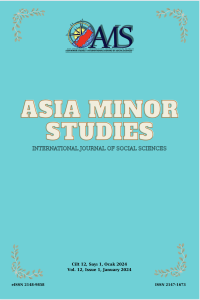Ömer Ziyâüddin Dağıstânî ve Dönemin Siyasî Dönüşümüne Etkisi
Ömer Ziyâüddin Dagestani and His Effect on the Political Transformation of the Period
Author(s): Demet Karasu, Mehmet Kerem KarasuSubject(s): Political history, 19th Century, Pre-WW I & WW I (1900 -1919), Interwar Period (1920 - 1939), The Ottoman Empire
Published by: Kilis 7 Aralık Üniversity
Keywords: Dagestani; Koran; Hadiths; Politics; Sultan II. Abdulhamid;
Summary/Abstract: Hadith, which are an important reference source among Islamic sources, are important both from the point of view of social life and from the point of view of its religious aspect. In particular, its social component revealed the need to protect and legitimize authentic hadiths. Considering the efforts of change and transformation in almost every period, the influence of hadith studies on the modernization process of Turkey cannot be underestimated, especially when one takes into account the influence of the ulema on society. In this context, the Sufis don`t stand aside in the process of modernization, but, on the contrary, the administrators influenced the rulers of that period. One of them, undoubtedly, is Omer Ziyauddin Dagestani, one of the members of the Gyumushkhanevi monastery, who wrote many works on the relationship between the state and mysticism in this sense. The Dagestani, who was not against modernization, contributed to political transformations with his works. Sufism, especially the application of the Qur'an and Hadith, saw the survival of the state with modernization. He is of the opinion that until these two main sources of Islam will not be abandoned, the state will continue to exist for a long time. In this context, Dagestani's hadith works, especially his views on forty hadiths and his political associations draw attention. Research on this issue will be evaluated in this direction.
Journal: Asia Minor Studies
- Issue Year: 2024
- Issue No: 1
- Page Range: 53-64
- Page Count: 12
- Language: Turkish

